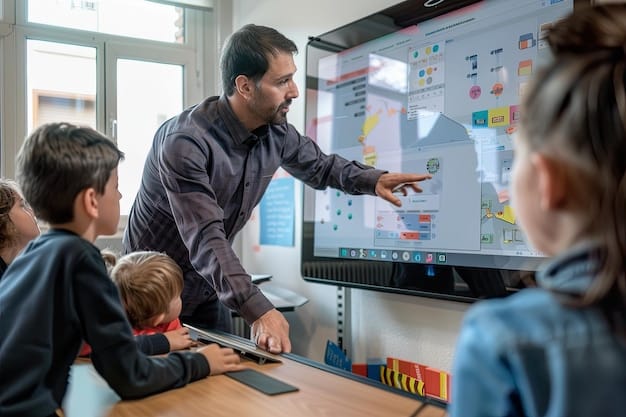AI in Education: Preparing Students for Future Jobs

The Impact of Artificial Intelligence on Education: Preparing Students for the Future Job Market is transforming how we teach and learn, offering personalized learning experiences and equipping students with the skills needed for increasingly AI-driven industries.
The integration of technology into education is no longer a futuristic concept, but a present-day reality. Among these technologies, the impact of artificial intelligence on education: preparing students for the future job market stands out as a transformative force, reshaping not only how students learn, but also the skills they need for the jobs of tomorrow. This article explores the profound implications of AI in education and how educators can leverage it to prepare students for success.
Understanding AI’s Influence on Education
Artificial Intelligence (AI) is rapidly changing various sectors, and education is no exception. Its influence spans from personalized learning experiences to automating administrative tasks, creating a more efficient and effective educational environment. By understanding these impacts, educators can better prepare their students for an AI-driven world.
Personalized Learning Experiences
AI enables the creation of customized learning paths tailored to individual student needs and learning styles. This personalized approach can significantly enhance engagement and academic outcomes. Here’s how:
- Adaptive Learning Platforms: AI algorithms analyze student performance data to adjust the difficulty and content of lessons in real-time.
- Individualized Feedback: AI-powered systems provide immediate and specific feedback, helping students identify and correct their mistakes.
- Custom Content Delivery: AI curates educational resources and materials that align with specific learning preferences and knowledge gaps.
These personalized experiences empower students to take ownership of their learning, fostering a growth mindset and a deeper understanding of the subject matter.

Automating Administrative Tasks
AI also plays a crucial role in streamlining administrative processes, freeing up educators’ time and resources. By automating routine tasks, AI helps teachers focus on what they do best: teaching. This efficiency improves the overall quality of education.
- Grading and Assessment: AI tools automate the grading of objective assessments, providing quick and accurate results.
- Scheduling and Resource Management: AI optimizes class schedules and manages educational resources, ensuring efficient allocation.
- Communication and Support: AI chatbots handle routine inquiries from students and parents, offering 24/7 support and information.
The combined impact of AI on personalization and automation creates a transformative shift in how education is delivered, enhancing both the learning experience and administrative efficiency.
In conclusion, understanding AI’s influence on education is essential for educators to leverage its potential effectively. From creating personalized learning experiences to automating administrative tasks, AI offers powerful tools that can enhance the educational environment and prepare students for future success.
Skills Students Need for an AI-Driven Job Market
As AI continues to permeate various industries, the skills needed in the job market are evolving rapidly. Preparing students for this future requires a focus on both technical and soft skills that complement AI technologies.
Technical Skills
While not every student needs to become an AI developer, basic proficiency in technical skills is becoming increasingly valuable. These skills include:
- Data Analysis: Understanding how to interpret and analyze data is crucial in an AI-driven world.
- Programming: Basic coding skills enable students to understand and interact with AI systems.
- AI and Machine Learning Fundamentals: Knowledge of AI concepts and machine learning algorithms provides a foundation for future learning and innovation.
These technical skills provide students with the tools to understand, adapt, and contribute to AI-driven industries. They foster innovation and problem-solving abilities.
Soft Skills
In addition to technical skills, soft skills such as critical thinking, creativity, and collaboration are essential for success in the future job market. These skills allow students to harness AI’s potential. Human skills remain indispensable.
- Critical Thinking and Problem-Solving: The ability to analyze complex problems and develop innovative solutions is paramount in an AI-augmented workplace.
- Creativity and Innovation: AI can handle routine tasks, but human creativity is needed to drive innovation and adaptation.
- Collaboration and Communication: Effective teamwork and communication skills are crucial for collaborating with AI systems and human colleagues.

Cultivating these soft skills equips students with the adaptability and resilience necessary to thrive in an ever-changing job market. The importance of human qualities in conjunction with AI cannot be overstated.
In conclusion, preparing students for an AI-driven job market requires a balanced approach that integrates technical skills with essential soft skills. This comprehensive skill set positions students for success in various AI-related roles and empowers them to navigate the future of work confidently.
Integrating AI Tools into the Classroom
Effectively integrating AI tools into the classroom can enhance teaching and learning experiences. This integration requires careful planning, training, and a focus on leveraging AI to support, not replace, human educators.
AI-Powered Educational Platforms
Several AI-powered educational platforms can enhance learning outcomes. These platforms offer personalized learning experiences, automated assessment, and insightful analytics. Here are some approaches:
- Implementing Adaptive Learning Systems: Utilize platforms that adjust difficulty levels based on student performance, ensuring that each student is challenged appropriately.
- Using AI for Automated Feedback: Employ AI tools that provide immediate and specific feedback on student assignments, improving comprehension.
- Creating AI-Driven Educational Content: Develop or adopt educational content that uses AI to deliver engaging and personalized learning materials.
Best Practices for AI Integration
To ensure successful AI integration, educators should adopt best practices that promote effective and ethical use of AI tools. Focus on transparency, ethical considerations, and a clear understanding of how AI complements human instruction.
- Prioritize Transparency and Explainability: Educators should understand how AI tools work and be able to explain their processes to students.
- Address Ethical Considerations: Implement policies that address data privacy, algorithmic bias, and equitable access to AI tools.
- Encourage Human-AI Collaboration: Emphasize that AI is a tool to enhance learning, not a replacement for human interaction and critical thinking.
By following these practices, educators ensure that AI is used effectively and ethically, enhancing learning environments. Promoting AI as a collaborative asset leads to comprehensive educational development.
In conclusion, integrating AI tools effectively into the classroom can transform the educational experience, enhancing both teaching and learning. By leveraging AI-powered platforms and adopting best practices, educators can create dynamic and engaging learning environments that prepare students for an AI-driven future.
The Role of Educators in the Age of AI
As AI permeates the educational landscape, the role of educators is evolving from traditional instructors to facilitators of learning, mentors, and guides. This transformation requires educators to adapt and embrace new skills and methodologies.
Facilitating Learning
Rather than delivering information directly, educators now facilitate student-led learning experiences by providing resources, guidance, and support. Adapt teaching strategies to align with AI technologies. Here are some adjustments:
- Encouraging Active Learning: Promote collaborative projects, discussions, and hands-on activities that engage students actively in the learning process.
- Providing Personalized Support: Use AI insights to identify individual student needs and offer tailored support and guidance.
- Fostering Critical Thinking: Encourage students to question assumptions, analyze information, and develop reasoned arguments, complementing AI insights.
Promoting Digital Literacy
Educators play a critical role in promoting digital literacy and ensuring students understand responsible and ethical technology use. Foster digital citizenship beyond basic technology skills. Here are ways to enhance digital training:
- Teaching Digital Responsibility: Educate students about online safety, privacy, and responsible social media use.
- Encouraging Ethical Technology Use: Promote ethical considerations in technology design, development, and application.
- Addressing Algorithmic Bias: Help students understand how algorithms can perpetuate bias and how to mitigate these issues.
In conclusion, the role of educators in the age of AI is evolving to encompass facilitation, mentorship, and digital literacy promotion. By adapting their skills and methodologies, educators empower students to thrive in an AI-driven world, fostering critical thinking, digital responsibility, and ethical technology use.
Developing Essential Skills
Educators are instrumental in helping students develop critical thinking abilities, creativity, and problem-solving skills. Incorporating these elements into curriculum design produces adaptable, innovative professionals.
- Implementing Project-Based Learning: Assign comprehensive projects that require students to apply critical thinking skills by analyzing complex scenarios.
- Encouraging Creative Expression: Nurture originality through visual arts, performing arts, and inventive writing.
- Promoting Collaborative Problem-Solving: Facilitate group projects requiring brainstorming, collaborative strategy, and resolution methods.
The integration of these essential skills prepares students not only for current positions but also ensures their capacity to adapt to technology shifts.
As AI continues to advance, education must remain a dynamic balance between technology adaptation and core human-centric abilities, equipping individuals to succeed in an increasingly automated future.
Addressing Challenges and Concerns
While AI offers numerous benefits, its integration into education also presents challenges and concerns that must be addressed thoughtfully. Addressing these concerns requires proactive planning, ethical considerations, and community involvement.
Data Privacy and Security
The use of AI in education involves collecting and analyzing vast amounts of student data, raising concerns about privacy and security. Protecting student data is crucial for maintaining trust and ethical standards. Here’s how:
- Implementing Data Protection Policies: Establish clear and comprehensive data protection policies that govern the collection, storage, and use of student data.
- Ensuring Data Security: Invest in robust security measures to protect student data from unauthorized access and cyber threats.
- Providing Transparency and Control: Give students and parents transparent information about how their data is used and provide them with control over their data privacy settings.
Bias and Fairness
AI algorithms can perpetuate and amplify existing biases if they are trained on biased data. Ensuring fairness and equity in AI systems is essential for upholding educational values. Here’s how:
- Using Diverse and Representative Data: Training AI algorithms on diverse and representative datasets to minimize bias.
- Monitoring and Auditing AI Systems: Regularly monitoring and auditing AI systems for bias and unfair outcomes.
- Promoting Algorithmic Transparency: Encouraging transparency in AI algorithms to allow for scrutiny and accountability.
The Digital Divide
Unequal access to technology and internet connectivity can exacerbate existing inequalities, creating a digital divide. Bridging this divide is essential to ensure equitable access to AI-enhanced educational opportunities. Here’s how:
- Investing in Infrastructure: Expanding access to high-speed internet and technology devices in underserved communities.
- Providing Training and Support: Offering training and support to students and educators on how to use AI tools effectively.
- Offering Affordable Access: Implementing programs that provide affordable or free access to AI-powered educational resources.
In conclusion, addressing the challenges and concerns associated with AI in education requires a comprehensive approach that prioritizes data privacy, fairness, and equitable access. By proactively addressing these issues, educators and policymakers can ensure that AI enhances educational opportunities for all students, fostering an inclusive and equitable learning environment.
Future Trends in AI and Education
The field of AI in education is constantly evolving, with new innovations and trends emerging regularly. Staying informed about these trends is essential for educators and policymakers seeking to leverage AI’s full potential. This section highlights key areas.
Virtual and Augmented Reality
The integration of virtual reality (VR) and augmented reality (AR) with AI is creating immersive learning experiences that enhance student engagement and knowledge retention. Explore how AI enhances the VR/AR experience:
- Personalized VR Learning Environments: AI tailors VR learning experiences to individual student needs, providing customized content.
- Interactive AR Applications: AI integrates interactive elements into AR applications, enriching learning processes.
- AI-Driven Adaptive Simulations: AI uses data analysis to adjust simulation complexity to align with individual proficiency.
AI-Powered Tutors
AI-powered virtual tutors are becoming increasingly sophisticated, providing personalized support and guidance to students. These tutors can offer 24/7 assistance, adaptive lessons, and customized feedback. Their capabilities keep improving:
- Personalized Tutoring: AI-powered tutors assess a student’s skill set and adapt learning sessions accordingly.
- Real-Time Feedback and Support: Immediate help and error analyses are available through AI assistance anytime.
- Comprehensive Learning Resources: Access extensive resource repositories and guided tutorials based on specific student demands.
Staying informed about these trends helps stakeholders use technology effectively, promoting continuous improvement.
| Key Point | Brief Description |
|---|---|
| 🤖 AI in Education | AI enhances personalized learning and automates administrative tasks. |
| 🚀 Skills for the Future | Technical and soft skills are essential for success in AI-driven jobs. |
| 👨🏫 Educator’s Role | Educators are now facilitators, mentors, and promoters of digital literacy. |
| ⚖️ Challenges | Addressing data privacy, bias, and the digital divide is crucial. |
FAQ Section
▼
AI personalizes learning by analyzing student performance data to adjust the difficulty and content of lessons. This allows for customized learning paths that cater to individual student needs and learning styles.
▼
Key technical skills include data analysis, programming, and a basic understanding of AI and machine learning. These skills enable students to understand and interact with AI systems effectively.
▼
Educators can integrate AI tools by using AI-powered educational platforms, implementing adaptive learning systems, and using AI for automated feedback to enhance teaching and learning experiences.
▼
The main concerns include data privacy and security, the potential for bias in AI algorithms, and the digital divide. Addressing these issues ensures AI benefits all students equitably.
▼
Future trends include integrating virtual and augmented reality (VR/AR) with AI and the development of more sophisticated AI-powered tutors that can offer personalized support and guidance to students.
Conclusion
In conclusion, the impact of artificial intelligence on education: preparing students for the future job market is substantial and continuously evolving. By embracing AI tools, addressing challenges, and focusing on essential skills, educators can prepare students for success in an AI-driven world, fostering a generation of innovative, adaptable, and responsible professionals.





